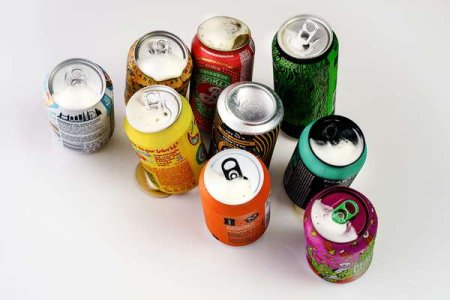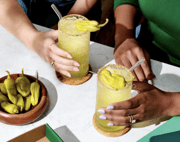Drinking THIS can skyrocket your stroke risk by 22% –The bubbly truth revealed by scientists!
- Replies 0
Disclaimer: The information provided in this article is for educational purposes only and is not intended as a substitute for professional medical advice, diagnosis, or treatment. Always consult your physician or other qualified healthcare providers with any questions you may have regarding a medical condition or before making any changes to your health regimen.
In the quest for a refreshing sip, many of us reach for a can of something fizzy without a second thought. But what if that seemingly innocuous carbonated drink could significantly impact your health?
A groundbreaking study has popped the lid off a startling revelation: consuming too many carbonated drinks may increase your risk of stroke by a whopping 22%.
Today, we're diving into the effervescent details of this research to help you understand the risks and make informed choices for your health.
The study, conducted by the University of Galway in collaboration with McMaster University and an international network of stroke researchers, is part of the INTERSTROKE research project—one of the largest studies examining stroke risk factors.
Nearly 27,000 participants from 27 countries were involved, providing a broad and diverse data set for the researchers to analyze.
The researchers defined carbonated beverages as including cola, non-cola beverages (both sweetened and unsweetened), tonic water, and instant iced tea.
Unfortunately, the data did not differentiate between drinks sweetened with sugar, artificial sweeteners, or unsweetened options like seltzer, lumping them all into one category.

The findings were clear: regular consumption of fizzy drinks was associated with a 22% increased risk of stroke. This risk escalated for individuals who indulged in two or more carbonated drinks daily.
The study also shed light on store-bought fruit juices, which often contain concentrates, added sugars, and preservatives. These types of juices were linked to a 37% increase in the risk of hemorrhagic strokes, and for those consuming two fruit juice drinks per day, the risk tripled.
The analysis highlighted regional differences, with the link between fizzy drinks and stroke risk being particularly pronounced in Eastern and Central Europe, the Middle East, Africa, and South America.
Additionally, women showed a greater increase in stroke risk associated with fruit juice intake.
On a positive note, the study found that tea consumption could be beneficial. Drinking three to four cups of black tea daily was correlated with a 29% lower chance of stroke, while the same amount of green tea resulted in a 27% lower risk.
Given these findings, it's essential to consider how we can reduce our stroke risk. Here are some practical tips:
1. Limit fizzy drinks: Cut back on sugary and artificially sweetened carbonated beverages. Water, herbal teas, or water infused with fruits are healthier alternatives that can still satisfy your craving for a flavorful drink.
2. Be mindful with fruit juices: Opt for 100% pure juices without added sugars or preservatives and enjoy them in moderation. Better yet, eat whole fruits to benefit from the fiber and nutrients without the concentrated sugars.
3. Stay hydrated: Drinking plenty of water is crucial for many bodily functions, including supporting cardiovascular health. Aim for at least eight glasses a day, and remember that hydration needs can vary based on activity level, climate, and individual health.
The INTERSTROKE study's recent findings underscore a concerning link between high consumption of carbonated beverages and an increased stroke risk.
While the study did not distinguish between different types of sweeteners in carbonated drinks, it's a good reminder that limiting added sugars in your diet is a wise move for heart health and overall well-being.

Have you made changes to your beverage choices based on health concerns? Share your experiences in the comments below!
In the quest for a refreshing sip, many of us reach for a can of something fizzy without a second thought. But what if that seemingly innocuous carbonated drink could significantly impact your health?
A groundbreaking study has popped the lid off a startling revelation: consuming too many carbonated drinks may increase your risk of stroke by a whopping 22%.
Today, we're diving into the effervescent details of this research to help you understand the risks and make informed choices for your health.
The study, conducted by the University of Galway in collaboration with McMaster University and an international network of stroke researchers, is part of the INTERSTROKE research project—one of the largest studies examining stroke risk factors.
Nearly 27,000 participants from 27 countries were involved, providing a broad and diverse data set for the researchers to analyze.
The researchers defined carbonated beverages as including cola, non-cola beverages (both sweetened and unsweetened), tonic water, and instant iced tea.
Unfortunately, the data did not differentiate between drinks sweetened with sugar, artificial sweeteners, or unsweetened options like seltzer, lumping them all into one category.

Excessive consumption of carbonated drinks may increase the risk of stroke by 22%, according to new research findings. Image source: Pexels / Sebastian Coman Photography.
The findings were clear: regular consumption of fizzy drinks was associated with a 22% increased risk of stroke. This risk escalated for individuals who indulged in two or more carbonated drinks daily.
The study also shed light on store-bought fruit juices, which often contain concentrates, added sugars, and preservatives. These types of juices were linked to a 37% increase in the risk of hemorrhagic strokes, and for those consuming two fruit juice drinks per day, the risk tripled.
The analysis highlighted regional differences, with the link between fizzy drinks and stroke risk being particularly pronounced in Eastern and Central Europe, the Middle East, Africa, and South America.
Additionally, women showed a greater increase in stroke risk associated with fruit juice intake.
On a positive note, the study found that tea consumption could be beneficial. Drinking three to four cups of black tea daily was correlated with a 29% lower chance of stroke, while the same amount of green tea resulted in a 27% lower risk.
Given these findings, it's essential to consider how we can reduce our stroke risk. Here are some practical tips:
1. Limit fizzy drinks: Cut back on sugary and artificially sweetened carbonated beverages. Water, herbal teas, or water infused with fruits are healthier alternatives that can still satisfy your craving for a flavorful drink.
2. Be mindful with fruit juices: Opt for 100% pure juices without added sugars or preservatives and enjoy them in moderation. Better yet, eat whole fruits to benefit from the fiber and nutrients without the concentrated sugars.
3. Stay hydrated: Drinking plenty of water is crucial for many bodily functions, including supporting cardiovascular health. Aim for at least eight glasses a day, and remember that hydration needs can vary based on activity level, climate, and individual health.
The INTERSTROKE study's recent findings underscore a concerning link between high consumption of carbonated beverages and an increased stroke risk.
While the study did not distinguish between different types of sweeteners in carbonated drinks, it's a good reminder that limiting added sugars in your diet is a wise move for heart health and overall well-being.
Key Takeaways
- Excessive consumption of carbonated drinks may increase the risk of stroke by 22%, according to new research findings.
- Store-bought fruit juices with concentrates, added sugars, and preservatives may offset any benefits of fresh fruit and are linked to a 37% increase in the risk of hemorrhagic strokes.
- Drinking tea, particularly black and green tea, could be associated with a lower risk of stroke.
- To reduce stroke risk, it is recommended to limit the intake of fizzy drinks and sugary fruit juices, opting instead for water, herbal teas, or 100% pure fruit juices in moderation.
Have you made changes to your beverage choices based on health concerns? Share your experiences in the comments below!






